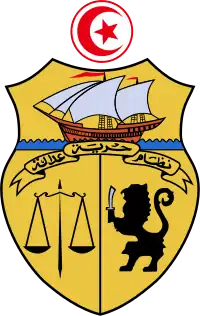Laarayedh Cabinet
The first cabinet of Tunisian Head of Government Ali Laarayedh was presented on 8 March 2013.[1] It was approved on 13 March 2013 by the Constituent Assembly of Tunisia.[2] Laarayedh resigned on 9 January 2014.[3] His successor, Mehdi Jomaa, took office on 10 January 2014.[4]
| Ali Laarayedh Cabinet | |
|---|---|
Cabinet of Tunisia | |
| Date formed | March 14, 2013 |
| Date dissolved | January 29, 2014 |
| People and organisations | |
| Head of state | Moncef Marzouki (CPR) |
| Head of government | Ali Laarayedh (Ennahda) |
| No. of ministers | 28 |
| Member parties | Ennahda, Ettakatol, CPR ("Troika") |
| Status in legislature | coalition government |
| History | |
| Election(s) | 2011 Constituent Assembly election |
| Legislature term(s) | Constituent Assembly (2011–2014) |
| Predecessor | Jebali Cabinet (2011–13) |
| Successor | Jomaa Cabinet (2014-15) |
 |
|---|
| This article is part of a series on the politics and government of Tunisia |
|
|
|
|
Cabinet members
The Laarayedh government consisted of the Prime Minister, three deputy prime ministers, 24 ministers and six state secretaries.[5]
| Office | Name | Party | |
|---|---|---|---|
| Head of Government | Ali Laarayedh | Ennahda | |
| Deputy Prime Minister | Noureddine Bhiri | Ennahda | |
| Deputy Prime Minister for Economy | Ridha Saidi | Ennahda | |
| Deputy Prime Minister for Governance and Fighting Corruption | Abderrahman Ladgham | Ettakatol | |
| Minister of Defence | Rachid Sabbagh | Independent | |
| Minister of Interior | Lotfi Ben Jeddou | Independent | |
| Minister of Foreign Affairs | Othman Jerandi | Independent | |
| Minister of Justice | Nadhir Ben Ammou | Independent | |
| Minister of Human Rights and Transitional Justice and Spokesperson of the Government |
Samir Dilou | Ennahda | |
| Minister of Religious Affairs | Nourredine Khadmi | Independent | |
| Minister of Finance | Elyes Fakhfakh | Ettakatol | |
| Minister of Industry | Mehdi Jomaa | Independent | |
| Minister of Commerce and Craft industry | Abdelwaheb Maatar | CPR | |
| Minister of Tourism | Jamel Gamra | Independent | |
| Minister of Social Affairs | Khalil Zaouia | Ettakatol | |
| Minister of Education | Salem Labiadh | Independent | |
| Minister of Public Health | Abdellatif Mekki | Ennahda | |
| Minister of Development and International Cooperation | Lamine Doghri | Independent | |
| Minister of Training and Employment | Naoufel Jammali | Independent | |
| Minister of Transport | Abdelkarim Harouni | Ennahda | |
| Minister of Communication Technologies | Mongi Marzouk | Ennahda | |
| Minister of Equipment and Environment | Mohamed Salmane | Ennahda | |
| Minister of Youth and Sports | Tarak Dhiab | Independent | |
| Minister of Culture | Mehdi Mabrouk | Independent | |
| Minister of Women’s Affairs | Sihem Badi | CPR | |
| Minister of Higher Education | Moncef Ben Salem | Ennahda | |
| Minister of State Property and Real Estate Affairs | Slim Ben Hamidene | CPR | |
| Minister of Agriculture | Mohamed Ben Salem | Ennahda | |
References
- "Prime Minister-Designate Names Members of New Cabinet". Tunisia Live. 8 March 2013. Archived from the original on 20 January 2014. Retrieved 11 November 2014.
- "Tunisian lawmakers approve new government headed by Ennahda". Al Arabiya. 13 March 2013. Retrieved 10 January 2014.
- "Tunisia's Islamist PM steps down as unrest mounts". Tunisia-Live. 9 January 2014. Retrieved 10 January 2014.
- "Tunisia's new PM takes office after Islamists resign". Reuters. 10 January 2014. Retrieved 10 January 2014.
- "La composition complète du gouvernement d'Ali Larayedh". Leaders. 8 March 2013. Archived from the original on 1 January 2014. Retrieved 11 November 2014.
This article is issued from Wikipedia. The text is licensed under Creative Commons - Attribution - Sharealike. Additional terms may apply for the media files.